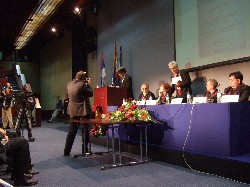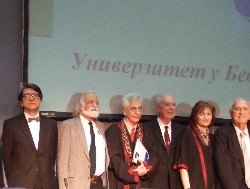Award Winners
Professor Katsuhito Iwai received an Honorary Doctorate



On April 4th, 2009, Professor Katsuhito Iwai received an Honorary Doctorate from the University of Belgrade of Serbia Republic for his contributions to Economic and Legal Theory and his analysis of the Japanese Economy. The University of Belgrade has played the central role in higher education and advanced research in Serbia and its neighbors and is now commemorating its 200th anniversary. Other recipients of Honorary Doctorate are Professor Martin Perl of Stanford University (Experimental Particle Physics and Cosmology), Professor Michael Flynn of Stanford University (Wireless Sensor Networks), Professor Yale Patt of University of Texas at Austin (Computer Micro Architecture), Rector Hans Peter Liebig of Hohenheim University(Environmental Issues and Agricultural Science). In the afternoon of April 2nd the recipients of Honorary Doctorate were greeted by President Nikola Hajdin and other representatives of Serbia Academy of Sciences and Arts (SASA) as well as by Vice Prime Minister Bozidar Djelich of Serbia Republic, and took part in SASA's reception party in the evening. On April 3rd, they joined the opening ceremony of World Rector Conference in the morning and had an honor to be present at a welcome party hosted by the Prince of Serbia and his wife in the evening. The Presentation Ceremony of Honorary Doctorates took place in the morning of April 4th and each recipient gave a thirty minutes speech on his work in the afternoon. There was a grand gala concert at Sava Center in the evening, followed by a celebration party attended by the finance minister and other dignitaries. Professor Iwai also received many TV, Radio and Newspaper interviews on global economic crisis and other issues during his stay in Belgrade. The following are a copy of Professor Iwai's acceptance speech delivered at the Presentation Ceremony and of his answers to an interview conducted by Professor Milutinovic of University of Belgrade for ISPS Journal.
Acceptance Speech by Katsuhito Iwai
For an Honorary Doctorate from the University of Belgrade
2009/04/04
Your Excellencies, Distinguished Professors, Dear Students, and Ladies and Gentlemen.
It is my greatest honor to receive an Honorary Doctorate from the University of Belgrade, the oldest university in the Republic of Serbia, together with such illustrious scientists as Professors Perl, Flynn, Patt, and Liebig.
I would like to thank many people who have made all this possible, especially Rector Kovacevic, Minister Djelich, Professor Milutinovic, who is indeed a super-organizer, and his colleagues in the University of Belgrade.
I am an economist, as Professor Teodorovic's introduction has informed you.
Well, in all appearances it seems that this is not a good time to be an economist.
As you all know, we are now in "once a hundred years" global economic crisis.
We, economists, are blamed for all the mess this global economic crisis has brought about.
Indeed, in the last forty years, the orthodoxy in the field of economics has been the neoclassical school that championed the self-regulating nature of laissez-faire capitalistic system.
They have claimed that the wider and the deeper the capitalistic system covers the economy, the more efficient and the more stable the economy would become.
In this sense, the so-called "globalization" can be interpreted as a grand-scale "experiment" of the basic laissez-faire philosophy of the neoclassical school.
Then, suddenly, the global economic crisis erupted!
The grand experiment of the neoclassical economics failed grandly, depriving it of its scientific credibility.
Does this mean the End of Economics as a scientific discipline?
The answer is No.
Fortunately, there are alternative schools of thoughts that have long opposed to the neoclassical school.
One of them is the school initiated by a Swedish economist called Knut Wicksell and developed by none other than John Maynard Keynes.
I am proud I am one of the few economists who carried their intellectual DNA during the long years of neoclassical orthodoxy.
I, however, hasten to remind you that I am not a romantic utopian who dreams of the abolition of money, finance and capitalistic economy.
I indeed agree with the neoclassical school that the capitalist economy is the most efficient economic system at its microscopic level.
What I have claimed is that such increase in microscopic efficiency would come hand in hand with macroscopic instability, in the forms of bubbles and panics, booms and depressions, or hyperinflations and crises.
An "inconvenient truth" about the capitalistic economy is that there is a trade-off between microscopic efficiency and macroscopic stability.
And, the on-going global economic crisis has demonstrated this inconvenient truth conclusively.
Indeed, as we suddenly all know, in order to sustain efficient economic development we need well-designed governmental regulations and well-timed policy interventions.
A real irony is that for its healthy dynamism the capitalism has to be freed from the shackle of the laissez-faire ideology at macroscopic level.
When the orthodoxy failed, it opens up a wide field for the next generation of scholars to pursue different ideas and try new hypotheses.
In spite of all appearances, this is indeed an exciting time to be an economist!
I believe that my receiving this honor from your esteemed university, the rising star in the world of academic institutions, is an indication that the tide has already changed.
Thank you very much.
An Interview with Professor Katsuhito Iwai,
Faculty of Economics, the University of Tokyo,
for IPSI Journal
by Prof. Dr. Veljko Milutinovic,
Fellow of the IEEE, Department of Computer Engineering,
the University of Belgrade
1. What is the essence of the contribution for which you received the largest prize?
A1. To me all the prizes I have received are equally meaningful but publicly, Medal with Purple Ribbon from the Japanese government is perhaps the most significant. It is given for my contributions to economic theory in general. There are four major works I have done in economic theory -- (1) Disequilibrium Dynamics, (2) Theory of Money, (3) Evolutionary Economics, and (4) Theory of Corporation. Their specific contents differ widely, but they are all theoretical endeavors to construct alternative foundations to the neoclassical orthodoxy in economics and other social sciences.
My work on disequilibrium dynamics demonstrates that the laissez-faire market mechanism is intrinsically unstable by constructing a macro dynamic model that explicitly incorporates decentralized price-formation process and monetary nature of market exchanges. My bootstrap theory of money shows that everybody accepts money as money simply because everybody else accepts money as money. It thus implies that, once everybody begins to fear that not everybody accepts money as money, money ceases to circulate as money and the economy collapses into a mere barter system. My modeling of evolutionary economic process exhibits that profits in excess of normal rate never vanish from the economy because what the economy approaches in the long-run is not a neoclassical equilibrium of uniform technology but at best a statistical equilibrium of technological disequilibria. Finally, my theory of corporation provides a new characterization of business corporation as an entity consisting of two-tier ownership relations -- the shareholders own the corporation as a thing that is tradable in share markets, and the corporation as a legal person owns the corporate assets in turn. It is able to explain why in spite of the rapid globalization of Anglo-American corporate governance that dictates corporate managers to seek the shareholders' returns as the sole objective, Japanese corporations still place more emphasis on the survival and growth of their organization as going concern.
2. What are the impacts of this contribution?
A2. My contributions to economic theory are still heterodox, and I have no intention to claim their wide impacts outside of Japan. But the on-going "once in a hundred years" global economic crisis has clearly pronounced the failure of the neoclassical orthodoxy that has championed, in the last 40 years, the self-regulating nature of laissez-faire market economy.
3. What are the applications of your contribution that may change the everyday life?
A3. Let me quote from the last paragraph of John Maynard Keynes' General Theory of Employment, Interest and Money (1936). "[T]he ideas of economists and political philosophers, both when they are right and when they are wrong, are more powerful than is commonly understood. Indeed the world is ruled by little else. Practical men, who believe themselves to be quite exempt from any intellectual influences, are usually the slaves of some defunct economist. Madmen in authority, who hear voices in the air, are distilling their frenzy from some academic scribbler of a few years back."
4. Can you shed more light on the last answer?
A4. If works of an economist or a social scientist in general can change the people's everyday life, it is mainly through their influences on the mental framework though which people look at the society and understand the way it works.
5. Can you tell us, what are the issues that we have to teach our kids, so they become creative when they finish studies?
A5. I may have misunderstood the point of your question, but for a social scientist like me, it is very important to teach students that social sciences are "sciences" that are as scientific as physical and biological sciences are. It is because there are in this world not only physical entities and biological entities but also "social entities" like language, law and money. For instance, money is a mere sheet of paper or a small disc of metal that has no or little intrinsic utility as a thing, and we humans are not genetically programmed to accept it as a valuable thing. Yet, when we find a piece of Euro bill or Euro coin on a street, we stop walking as if we stumble upon a stone and we feel happy as if we see a cute little kitten. To understand why such a physical and biological non-entity can nevertheless function as a full-fledged entity in a human society is scientifically as challenging as solving Schroedinger equation or decoding human genomes.
6. What are the major things to keep in mind, when you form a team for a scientific experiment, or similar?
A6. Since I have not done any scientific experiment, I do not have any suggestion to make on this subject.
7. What are the people to avoid, when trying to generate a break-through achievement?
A7. A necessary condition for a person to become creative is not to be afraid of straying away from the main trends of scientific community. This is, unfortunately, not a sufficient condition for any break-through.
8. What is your opinion about the impact of math?
A8. There is no doubt that sciences, even social sciences, have increasingly become mathematical. Many of my works in economic theory have indeed employed various branches of mathematics extensively. However, mathematical equations in economics and other social sciences are not the representations of laws of nature as in physics and genetics but merely tools to organize our thinking of particular problems amidst hugely complex social phenomena. I am afraid that too much reliance on mathematics in contemporary economic theory has led many economists to lose sight of this humble role of mathematics in social sciences.
9. When targeting a major breakthrough, how sensitive one has to be about the direct interests of tax-payers?
A9. Individually each scientist should not directly take consideration of the interests of tax-payers in his or her pursuit of scientific breakthrough. All that is required is to do a good work. In any mature democratic society it is only by way of a democratic budgetary process that the tax-payers' interests should influence scientific works.
10. What is the major driving force that motivates a person like you to continue to create and generate results after he-she receives such a big prize?
A10. First, a feeling of awe towards the world we live in which is so complex that we have understood so little of it; second, a sense of responsibility to contribute to make it a little better place tomorrow.
11. For small nations like Serbian, what is your advice, which road to take, when it comes to science?
A11. There should be a global division of labor not only in production of economic goods but also in production of scientific knowledge. Try to concentrate on a few selected fields so that you can marshal a sizable number of scientific talents to form a critical mass in each of them.
12. What road to take, when it comes to its general future development plans?
A12. The recent global economic crisis have told us an important lesson that in order to survive and flourish in the 21st century every nation has to find a delicate balance between the openness and the closeness. Too much openness would make the nation vulnerable to global shocks and too much closeness would leave the nation stagnant in its economic, social and intellectual development. There is no globally optimal solution to this problem, and each nation has to discover its local optimum by itself.

